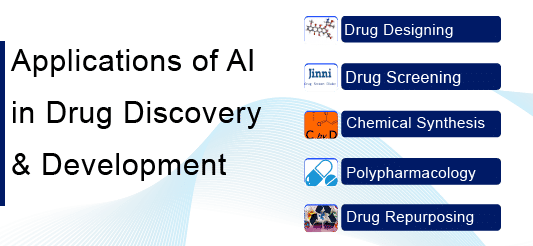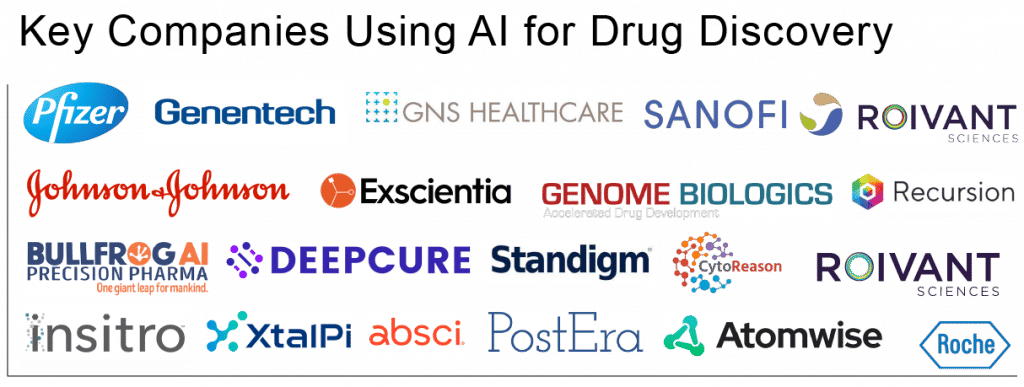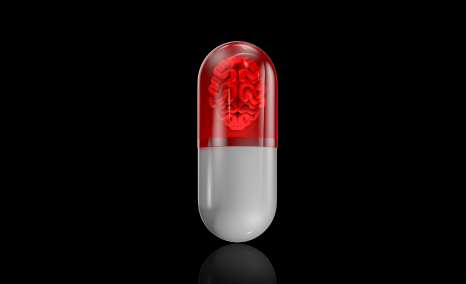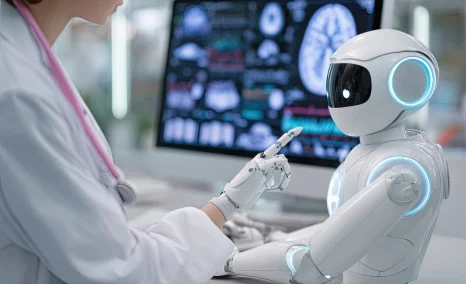How is Artificial Intelligence Used in Drug Discovery & Development?
Apr 27, 2022
Table of Contents
Artificial intelligence (AI) has become a part of modern life and continues to pique people’s interests. AI enables computers and robots to learn from past behaviour and mistakes in the same way that people can. It has permeated our daily lives, from search engines to self-driving cars to Siri. AI has the ability to make complicated drug development procedures quicker and more cost-effective, with the goal of lowering the time it takes for a new treatment to reach the patient. The excitement around AI has drawn the attention of the life sciences sector to technology.
In small-molecule drug discovery, AI can add value in four ways: access to new biology, improved or original chemistry, higher success rates, and faster and cheaper discovery methods. Many issues and limits in traditional R&D can be addressed by the technology. Each program adds new insights to drug discovery teams and, in certain circumstances, can completely reimagine long-standing operations. Understanding and differentiating between use cases are crucial because these technologies are relevant to a wide range of discovery scenarios and biological targets.
Downloads
Click Here To Get the Article in PDF
Recent Articles
- LensGen’s Juvene Intraocular Lens; Nevro announces clinical data publications; FDA Clearance to I...
- Applications of AI in Healthcare: COVID-19 and Beyond
- Wireless Brain Sensors: Revolutionizing Neuroscience and Healthcare
- Artificial Intelligence (AI) in Respiratory Care: An Opportune Time for Adoption in Clinical Sett...
- Evaluating the Essential Factors Building the Value-Based Healthcare Model
Leading biopharmaceutical firms feel a solution is close at hand. Pfizer is utilizing IBM Watson, a machine learning system, to support its quest for immuno-oncology treatments. Genentech, a division of Roche, is utilizing an AI system from GNS Healthcare to aid in the international company’s hunt for cancer medicines. The majority of major biopharma companies have such agreements or internal programs. In addition, recently, Sanofi and Exscientia established a research cooperation and licensing agreement to develop up to 15 novel small-molecule candidates in cancer and immunology, employing Exscientia’s end-to-end AI-driven platform and actual patient samples. Moreover, if the proponents of these approaches are correct, AI and machine learning will usher in a new age of faster, cheaper, and more effective drug development.
AI in Drug Designing
Due to developments in machine learning (ML) and artificial intelligence, the drug discovery paradigm is quickly expanding (AI). As is the case with ultra-high-throughput screening, the pharmaceutical industry finally settled on a combination of rational design and automated screening of huge industrial databases and libraries. Drug design has entered the era of artificial intelligence (AI) and personalized/precision medicine, due to the advent of high-performance computing with exascale and zettascale computer powers and advanced graphical processing units for parallel processing, as well as the ever-evolving technology in genome sequencing, bioinformatics, computational sciences, computational compound profiling, and precise protein structure databases. The AI can help in designing drug molecules in the following way:
Prediction of the Target Protein Structure
It is critical to assign the right target while creating a pharmacological molecule for successful therapy. Numerous proteins are involved in the disease’s development and, in certain situations, are overexpressed. As a result, for disease targeting that is selective, it is critical to anticipate the structure of the target protein in order to build the therapeutic molecule. Because the design is in accordance with the chemical environment of the target protein site, AI can aid in structure-based drug discovery by predicting the 3D protein structure. This helps to predict the effect of a compound on the target as well as safety considerations prior to their synthesis or production. AlphaFold, an AI tool based on DNNs, was used to assess the distance between neighbouring amino acids and the related angles of the peptide bonds to predict the 3D target protein structure and produced good results, accurately predicting 25 of 43 structures.
Predicting Drug-Protein Interactions
Drug–protein interactions are critical to a therapy’s effectiveness. Predicting a drug’s interaction with a receptor or protein is critical for understanding its efficacy and effectiveness, allowing drug repurposing, and preventing polypharmacology. Various AI approaches have been effective in accurately predicting ligand-protein interactions, resulting in improved therapeutic efficacy.

AI in Drug Screening
The process of researching and developing a drug can take more than a decade and costs an average of USD 2.8 billion. Even still, 9 out of 10 therapeutic molecules fail Phase II clinical studies and are not approved by regulators. Algorithms like as Nearest-Neighbor classifiers, RF, extreme learning machines, SVMs, and deep neural networks (DNNs) are used for VS and can predict in vivo activity and toxicity. Several biopharmaceutical companies, including Bayer, Roche, and Pfizer, have collaborated with IT firms to create a platform for the development of medicines in areas such as immuno-oncology and cardiovascular disease. The various aspects of VS in which AI has been used are:
Prediction of the Physiochemical Properties
Physicochemical features of the drugs, such as solubility, partition coefficient (logP), degree of ionization, and intrinsic permeability, have an indirect effect on their pharmacokinetic qualities and target receptor family, and must thus be addressed while creating a novel medicine. Physicochemical qualities may be predicted using a variety of AI-based methods. For example, Machine Learning trains the software using massive data sets generated from earlier compound optimization. Algorithms for drug design include chemical descriptors such as SMILES strings, potential energy measurements, electron density surrounding the molecule, and atomic coordinates in 3D, which are used to construct viable compounds using DNN and forecast their attributes.
Prediction of Bioactivity
The affinity of drug molecules for the target protein or receptor determines their effectiveness. Drug molecules that do not bind with or have an affinity for the targeted protein will not be able to provide the therapeutic response. In rare cases, created therapeutic compounds may potentially interact with undesired proteins or receptors, resulting in toxicity. As a result, drug-target binding affinity (DTBA) is essential for predicting drug-target interactions. AI-based approaches can calculate a drug binding affinity by taking into account the traits or similarities between the drug and its target.
Prediction of Toxicity
To avoid hazardous effects, it is critical to forecast the toxicity of any pharmacological molecule. Cell-based in vitro tests are frequently employed as exploratory investigations, followed by animal experiments to determine a compound’s toxicity, raising the cost of drug research. Toxtree, LimTox, pkCSM, admetSAR, and other web-based applications are available to assist minimize costs. Based on input characteristics, advanced AI-based techniques explore for similarities across chemicals or project the toxicity of the substance.
AI Chemical Synthesis
Chemical Synthesis is an essential part of the drug development process it deals with the preparation of a compound or molecule from available chemicals. Artificial intelligence (AI) has an advantage over humans and existing computational tools in chemical synthesis. AI can be trained to curate synthesis reaction data to identify stereochemical orientations during the reaction and predict the feasibility of synthesis for a given chemical reaction/compound. AI-based platforms for chemical reactions developed with an integrated approach combining both chemical and enzymatic catalysis.
To develop a drug there is an essential requirement to develop the structure of molecules and predict the feasibility of a particular reaction for the molecule used in the drug. Heavily trained AI can greatly boost the development of new drugs with their structures and compositions, especially for the chemical synthesis of complex natural compounds. Moreover, the AI platform can be trained on a diverse amount of chemical reactions which ultimately can provide more in-depth and quick insights into the chemical synthesis pathway and can deliver optimal reaction conditions which can optimize and deliver a higher yield. Overall it improves the timelines and decreases the cost.
AI in Polypharmacology
Drugs developed for a particular disease and disorder often interact with multiple targets rather than on one single target. For example, aspirin used as an analgesic to relieve minor pains or as an antipyretic to reduce fever is often used as an anti-inflammatory medication to treat rheumatoid arthritis, pericarditis, and Kawasaki disease. Polypharmacology deals with the recognition of these off-target activities of small chemical compounds. The unintended drug-target interactions could lead to side effects and can be a major concern in drug development programs. Over the past few years, several drugs have been withdrawn from markets due to side effects or toxicities.
For drug development, a very high amount of data is to be processed, and the existing computational/statistical methods are hard to implement in this segment. However, AI or machine learning techniques can be used to rationally design the next generation of more effective but less toxic therapeutic agents. Additionally, AI can also effectively assess the off-target activities of small chemical compounds.
AI can help to identify the pathways and mechanisms that can lead to side effects caused by drug binding to unwanted off-targets (adverse polypharmacology) and also assess the effects arising from hitting multiple targets (beneficial polypharmacology). Health experts acknowledge AI in polypharmacology as a new and valuable option for drug discovery and development. AI can find various similarity-based, network-based, and structure-based approaches to uncover polypharmacological relationships between ligand binding to multiple targets. AI for polypharmacology modelling is expected to witness rapid growth in drug discovery of complex diseases such as cancer and central nervous system diseases that require complex therapeutic approaches.
AI in Drug Repurposing
Drug repurposing (DR) (also known as drug repositioning) is an emerging approach that involves investigating old/existing/available drugs for new therapeutic use. Drug repurposing is an effective alternative approach to the traditional drug discovery process. Applications of Artificial Intelligence in drug repurposing are growing and evolving immensely as several key pharma companies are actively exploring this space, and the success rate could be potentially higher.
Various algorithms already exist for drug repurposing; however, AI methodologies can be more helpful in identifying potential repurposing targets. The AI in drug repurposing unifies the knowledge and actions and integrates real-world and experimental data to map out the best way to identify effective therapeutics against a disease. During the initial phase of the Covid-19, most pharma companies have shown interest in drug repurposing to accelerate the identification of drugs that can cure or prevent COVID-19. Drug Repurposing helps the pharma companies to save time and cost associated with the drug discovery and development. It also minimises the risk of failure and maximises the therapeutic value of a drug, and the success rate could be potentially higher. In some cases, drug repurposing can be useful for addressing unmet needs, such as rare diseases or overcoming drug resistance. Despite advancement, sometimes validation by AI-based algorithms are difficult as it may involve detailed translational experiments in animal models or costly clinical trials.
Key Pharmaceuticals and Startups in AI in Healthcare Segment
Globally, every year, pharma and biotech companies combinedly spend billions of dollars, immense amounts of manpower, time and other valuable resources in the drug development process. Despite heavy investment, the majority of the drugs fail to clear the phases of the clinical trial. Several therapies often result in side effects or are unable to provide the desired result. To overcome these challenges, healthcare companies are actively investing and investing to adopt AI-based solutions in their system. Some of the companies are building up their own in-house AI teams, while some are collaborating and investing in startups.

The prominent companies embracing artificial intelligence tools for drug research and development include Pfizer, Genentech, Roche, GNS Healthcare, Sanofi, Johnson & Johnson, among others. Similarly, over the past few years, several startups have started focusing to provide AI Platforms to tackle the fundamental challenge in drug design and development. Some of the key startups working in the segment to provide valuable solutions include Exscientia, Roivant Sciences, Genome Biologics, BullFrog AI, DeepCure, Standigm, CytoReason, Roivant Sciences, Insitro, Xtalpi, Absci, Exscientia, Postera, Atomwise, Recursion, and other. These startups have been able to secure massive amounts of funding over the past few years. Additionally, some of these have signed collaboration deals with major pharmaceutical giants to assist in their drug development process.
Conclusion
In the healthcare industry, the application of Artificial intelligence is growing at an exponential rate. AI in healthcare provides several benefits such as improving financial decisions, streamlining tasks, decreasing human error, reducing physician stress), increasing performance, and saving time and resources. AI techniques, especially machine learning (ML) and deep learning (DL), have demonstrated superior performance in many areas. The rapid growth in computer hardware & software and mathematical models, including a wide range of techniques, is expected to broaden the Artificial Intelligence applications in healthcare. Apart from drug development, the areas that require critical thinking and complex decision making will also be benefited significantly from the use of AI in the coming years.
Downloads
Article in PDF
Recent Articles
- Utilization of Artificial Intelligence for Drug Commercialization
- Diagnostic Precision: The Rise of Medical Imaging Technologies and Market Trends
- Evaluating the Essential Factors Building the Value-Based Healthcare Model
- Unlocking the Future of Women’s Healthcare Market: The Promise of FemTech
- 22 Healthcare Trends & Innovations to Watch in 2022 and Beyond



